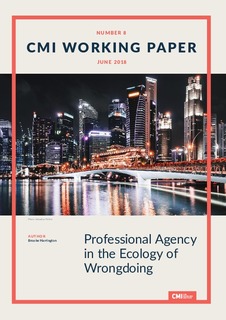Professional Agency in the Ecology of Wrongdoing
Working paper
Permanent lenke
http://hdl.handle.net/11250/2503828Utgivelsesdato
2018-06-01Metadata
Vis full innførselSamlinger
- Publications [1488]
Originalversjon
Bergen: Chr. Michelsen Institute (CMI Working Paper WP 2018:8)Sammendrag
This study offers an account of individual agency within a constructivist view of professional wrongdoing. The main contribution is a model in which the neglected role of individual professionals is foregrounded, offering the basis for testable propositions about future misconduct. Professionals are represented in the model neither as “bad apples” nor as passive recipients of social control; instead, they formulate independent understandings of wrongdoing and lines of action in response to the combined influences of globalization and of collective actors, such as states and professional societies. The model is derived inductively from data on the wealth management profession, which specializes in developing tax avoidance strategies for high-net-worth individuals. This case is particularly appropriate because tax avoidance is among the most hotly-contested domains of professional misconduct globally, particularly following the Panama Papers scandal of 2016. Drawing from 65 interviews with wealth managers in 18 countries, supplemented by data from newspaper accounts and the professional association, the analysis yields a model that adds granularity and variation to the constructivist approach.
This paper was prepared for the research project “Taxation, Institutions and Participation,” funded by the Research Council of Norway. The author would like to thank Odd-Helge Fjeldstad and two anonymous referees for valuable comments on earlier drafts. Views and conclusions expressed within this paper report are those of the author alone.
